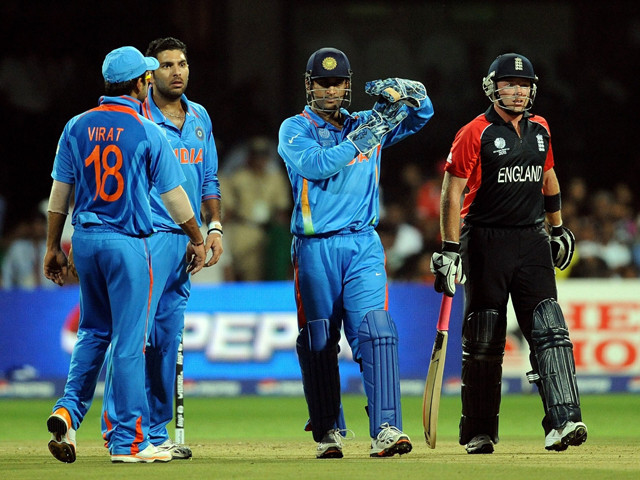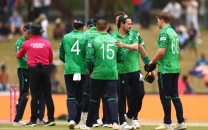Man or machine? Decision review system under fire
In a whirl of high-definition graphics, the Umpire Decision Review System is drawing flak at the World Cup.

The system, which allows teams to question an official's on-field decision, is being used for the first time in a World Cup after making its debut during the first Test between New Zealand and Pakistan in November 2009.
But India captain Mahendra Singh Dhoni believes the system is flawed and was furious that his side were denied a wicket following a review in their epic tie with England on Sunday.
India spinner Yuvraj Singh thought he had Ian Bell lbw on review when the batsman had made just 17, with replays showing the ball would have hit the stumps.
Bell was given not out by New Zealand umpire Billy Bowden but had started to walk off. However, the decision was returned to Bowden by Australian replay official Rod Tucker and the Kiwi deemed Bell to be too far down the pitch to be dismissed.
"The adulteration of technology with human thinking meant we didn't get that (Bell) wicket," said Dhoni, whose country refuses to use the system in home series.
He was unhappy with the instruction to umpires that says if a batsman is more than 2.5 metres down the pitch he should be given not out, unless the ball would have hit middle stump.
It was not certain if Bell's middle stump would have been knocked over but Dhoni said: "If Hawk-Eye says it's good and going to hit middle stump, I see no reason why the distance matters."
Bell went on to make 69 and shared a crucial third-wicket partnership of 170 with captain Andrew Strauss.
At the World Cup, the UDRS is missing two of its vital aids, the Hot Spot and the Snickometer.
The Hot Spot is an infra-red imaging system used to determine whether the ball has struck the batsman's bat or pad while Snickometer is used to ascertain if the ball touched the bat on its way to the wicketkeeper.
The unavailability of the Hot Spot and Snickometer means the third umpire only has the ball-tracker or Hawk-Eye, slow-motion replays and the stump microphone at his disposal.
The review system came under early scrutiny during Sri Lanka's World Cup opener with Canada.
Mahela Jayawardene, who scored a match-winning century, was the focus of two referrals from Canada for caught behind decisions, both of which went against the minnows.
TV replays in both cases were inconclusive and the benefit of doubt was given to the batsman.
"For us, this was the first time we were playing under that rule and our guys were not experienced with it," said Canada coach Pubudu Dassanayake.
"Definitely without Hot Spot you can't take proper decisions for caught behinds."
Jayawardene, despite benefiting in the absence of Hot Spot, said later it was a concern not having it as part of the UDRS.
"They don't have Hot Spot, and that's probably the downside to it. I don't think they have Snicko either.
"You need to make sure that fair decisions are being made and we need to help the umpires especially because in the conditions it's not easy for them to make correct decisions all the time."
That the technology is not foolproof was evident once again when Australia played New Zealand in Nagpur last week.
The umpires employed UDRS to determine whether Australian skipper Ricky Ponting edged a leg-side delivery to wicketkeeper Brendon McCullum but in vain.
Former Australian umpire Darrell Hair was scathing in his criticism of the review system, calling it detrimental to an umpire's confidence.
"If the game is going to sap the confidence of umpires to that extent, where they cannot trust their own calls to be made on basic bread-and-butter decisions, then the system has failed them," he said in comments carried by the Herald Sun newspaper.
"The ICC (International Cricket Council) should be working with their umpires to give them the skills and confidence to make correct decisions on the majority of occasions.
"A review system by its very nature will uncover mistakes but management of why these mistakes occur in the first place should be the priority."



















COMMENTS
Comments are moderated and generally will be posted if they are on-topic and not abusive.
For more information, please see our Comments FAQ